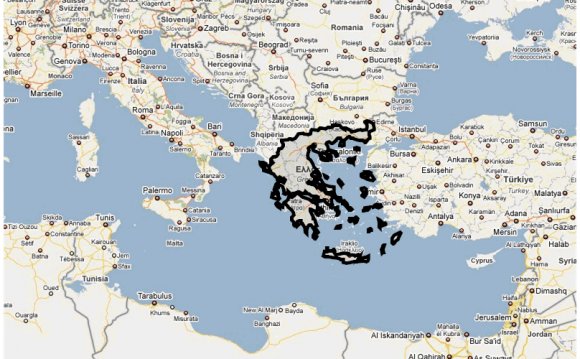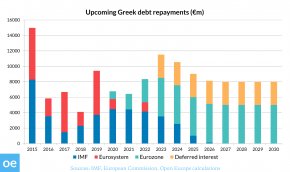
 While a compromise could still be possible, it will be quite painful to reach and will imply someone taking big steps back from their previous stance.
While a compromise could still be possible, it will be quite painful to reach and will imply someone taking big steps back from their previous stance.
Tonight that looks to have been proven true – at least in the short term.
What does this agreement do and why?
Tonight’s deal (you can read the full Eurogroup statement here) extends the current Master Financial Assistance Facility Agreement (MFAFA) by four months in order to allow Greece to fund itself in the short term and to allow time for negotiations over what happens afterwards.
The purpose of the extension is the successful completion of the review on the basis of the conditions in the current arrangement, making best use of the given flexibility which will be considered jointly with the Greek authorities and the institutions (European Commission, ECB and IMF – formerly known as ‘the Troika’).
Tonight’s agreement seems to essentially extend the existing agreement and the tied-in conditionality of the current Memorandum of Understanding.
What points has Greece capitulated on?
Completion of the current review – Greece has basically agreed to conclude the current bailout. Any funding is conditional on such a process:
Only approval of the conclusion of the review of the extended arrangement by the institutions in turn will allow for any disbursement of the outstanding tranche of the current EFSF programme and the transfer of the 2014 SMP profits. Both are again subject to approval by the Eurogroup.
This is a clear capitulation for Greek Prime Minister Alexis Tsipras, who said the previous bailout was “dead” and the EU/IMF/ECB Troika is “over”.
Remaining bank recapitalisation funds – Greece wanted this money to be held by the Hellenic Financial Stabilisation Fund (HFSF) over the extension period, and possibly be open for use outside the banking sector. However, this has been denied and the bonds will return to the EFSF, although they will remain available for any bank recapitalisation needs.
Role of the IMF – The Eurogroup statement says, “We also agreed that the IMF would continue to play its role”. Again, Greece has given in on this point and the Troika continues to exist and be strongly involved in all but name.
No unilateral action – According to the statement,
The Greek authorities commit to refrain from any rollback of measures and unilateral changes to the policies and structural reforms that would negatively impact fiscal targets, economic recovery or financial stability, as assessed by the institutions.
In light of this, a large number of promises that SYRIZA made in its election campaign will now be hard to fulfil. In the press conference given by Eurogroup Chairman Jeroen Dijsselbloem and EU Economics Commissioner Pierre Moscovici, it was suggested that this pledge also applied to the measures which were announced by Tsipras in his speech to the Greek parliament earlier this week – when he announced plans to roll back some labour market reforms passed by the previous Greek government.
Four months rather than six months – Greece requested a six-month extension, but the Eurogroup only agreed to four months. This is a crucial point: it means the extension expires at the end of June. As the graph below shows, Greece faces two crucial bond repayments to the ECB in July and August which total €6.7bn. This is a very tough hard deadline. There is limited time for the longer term negotiations which will take place – provided that a final agreement on the extension is reached. It is very likely we will be back in a similar situation at the end of June.
Has Greece secured any wins?
Greece has received a couple of small fillips in the wording:
The institutions will, for the 2015 primary surplus target, take the economic circumstances in 2015 into account.
This suggests that Greece may, during this year and the extension in particular, get more fiscal leeway. As we predicted many times, this would manifest itself as a lower primary surplus target. A small victory which may provide a bit of temporary breathing space for the government. In practice, though, it was already looking difficult for Greece to meet its target this year given significant shortfalls in tax revenue.
Greece also managed to get the word “bridge” into the statement, and a specific promise to discuss a fresh programme and approach:
This extension would also bridge the time for discussions on a possible follow-up arrangement between the Eurogroup, the institutions and Greece.
YOU MIGHT ALSO LIKE












